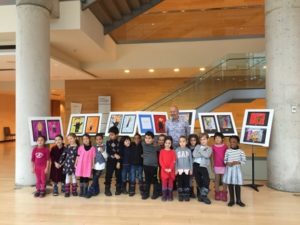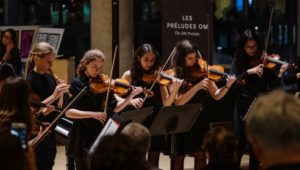While Orchestras Canada serves a national network of Canadian orchestras, our office is on the treaty and traditional territory of the Michi Saagiig Anishinaabeg. We offer gratitude to the First Peoples for their care for, and teachings about, our earth and our relations. We will honour those teachings.
We are grieved by the anti-Black racist events in recent weeks.
We acknowledge that our society is built on, yet critically weakened by, systemic racism.
Orchestras Canada is committed to a more just society for all.
We are committed to sustained and effective action, manifested through our internal practices and our service to orchestras and the music that is shared.
With much to learn, we approach this important work with humility and transparency, guided by colleagues with lived experience. Their guidance is truly a generous gift.
We call on Canadian orchestras to recruit Black people, Indigenous people, and People of Colour in decision-making roles, as board members, lead volunteers, arts workers, and arts leaders.
We call on Canadian orchestras to welcome Black artists, Indigenous artists, and artists of colour to their stages, as conductors, performers, soloists, composers, mentors, and creators.
Until Canadian orchestras are fully welcoming and accessible, Orchestras Canada will encourage orchestras to adopt external strategies and internal practices that will foster an inclusive network of diverse leaders, artists, arts workers, volunteers, and audiences.
At our national conference in 2016, members asked OC to take the lead on commissioning and curating resources to inform Canadian orchestras’ work in inclusion, diversity, equity, and accessibility. Since then, this work has been a focus for us, and has informed our research, knowledge-sharing, and convening practices, along with our nominating and recruitment efforts. The following is a short list of the resources that we’ve developed; more can be found here.
OC Resources
- Re-Sounding the Orchestra, a report by Soraya Peerbaye and Dr. Parmela Attariwala on relationships between Canadian orchestras, Indigenous peoples, and people of colour, published in 2019.
- IDEA Declaration: a sample commitment for Canadian orchestras, by OC’s Equity Committee, published in 2017.
- Perfect Fifth of Diversity, by Daniel Bartholomew-Poyser: five questions your orchestra should answer, published in 2019.
- Inclusive Leadership in Governance, by Cathy Winter, formerly of OnBoard Canada, published in 2019:
Other resources that we have found helpful
- Programming, from the Institute for Composer Diversity
- Organizational responses to the current crisis, from Of/By/For All
- Guidelines for Being Strong White Allies, by Paul Kivel, published in 2006.

 A letter from
A letter from  I should like to advocate the possibility of developing socially-inclusive, community-based ‘open’ youth ‘orchestras’, in partnership with established professional orchestras throughout Canada, as a strategic and practical response to the report’s understandably challenging and uncompromising demands, drawing on the Setúbal Youth Ensemble model which I have developed over the past five years through my Music Festival in Portugal. In brief, through an open auditioning process which makes no assumptions of any Eurocentric orchestral structure, the resulting Ensemble has recruited and maintained roughly a quarter of its membership from the aural tradition, reflecting the local population of immigrants from former African and South American colonies of Portugal, another quarter comprising young people with various disabilities and special needs, and approximately half coming via the mainstream of music education – all chosen for their talent. With the instrumentation dependent on the selected young musicians rather than the other way about, there is no standard repertory and therefore all the Ensemble’s music has be specially composed or arranged: this has given unique creative opportunities to a new generation of composers, embracing unusual instrumental combinations (including the use of accessible technology, where appropriate) and inventing special notations to enable the participation of those unable to read the conventional musical language. This Ensemble is Setúbal’s official ‘youth orchestra’.
I should like to advocate the possibility of developing socially-inclusive, community-based ‘open’ youth ‘orchestras’, in partnership with established professional orchestras throughout Canada, as a strategic and practical response to the report’s understandably challenging and uncompromising demands, drawing on the Setúbal Youth Ensemble model which I have developed over the past five years through my Music Festival in Portugal. In brief, through an open auditioning process which makes no assumptions of any Eurocentric orchestral structure, the resulting Ensemble has recruited and maintained roughly a quarter of its membership from the aural tradition, reflecting the local population of immigrants from former African and South American colonies of Portugal, another quarter comprising young people with various disabilities and special needs, and approximately half coming via the mainstream of music education – all chosen for their talent. With the instrumentation dependent on the selected young musicians rather than the other way about, there is no standard repertory and therefore all the Ensemble’s music has be specially composed or arranged: this has given unique creative opportunities to a new generation of composers, embracing unusual instrumental combinations (including the use of accessible technology, where appropriate) and inventing special notations to enable the participation of those unable to read the conventional musical language. This Ensemble is Setúbal’s official ‘youth orchestra’. The OM at School provides an opportunity for meaningful encounters between students and musicians, in the form of workshops held in schools, and by welcoming school groups to rehearsals and concerts. Last December, the art works of some 15 kindergarten students at École Notre-Dame-des-Neiges embellished the foyer of the Maison symphonique. The students, who attended the dress rehearsal, were able to see their works on display, and to present one as a gift to conductor Yannick Nézet-Séguin. In preparation for the outing, the students had learned about Schumann’s Piano Concerto, one of the works on the program, and were paid a visit by the OM’s artistic partner, conductor Nicolas Ellis, who answered their questions.
The OM at School provides an opportunity for meaningful encounters between students and musicians, in the form of workshops held in schools, and by welcoming school groups to rehearsals and concerts. Last December, the art works of some 15 kindergarten students at École Notre-Dame-des-Neiges embellished the foyer of the Maison symphonique. The students, who attended the dress rehearsal, were able to see their works on display, and to present one as a gift to conductor Yannick Nézet-Séguin. In preparation for the outing, the students had learned about Schumann’s Piano Concerto, one of the works on the program, and were paid a visit by the OM’s artistic partner, conductor Nicolas Ellis, who answered their questions. Playing it Forward aims to provide a forum for young musicians and to support their development through mentoring, master classes and other activities. The
Playing it Forward aims to provide a forum for young musicians and to support their development through mentoring, master classes and other activities. The